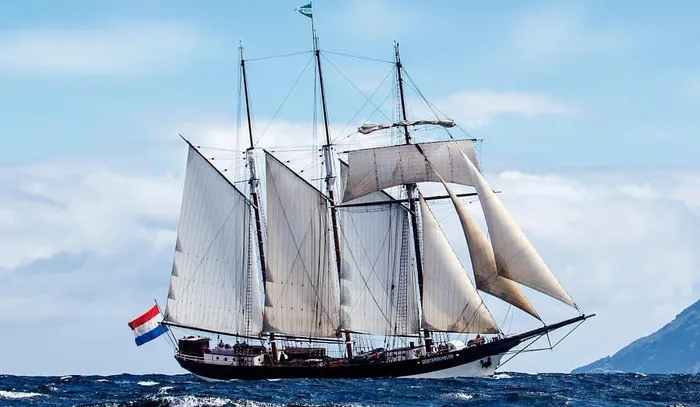Celebrating Darwin's historic Cape visit
The Oosterschelde, a tall Dutch ship retracing the voyage of the HMS Beagle, where naturalist, geologist and scientist Charles Darwin spent some years on, will soon dock in Cape Town to celebrate his life and legacy.
The legacy of Darwin, who is widely known as the "father of evolution", and the impact of his visit to the Cape Colony will be commemorated with a range of events during April.
The events form part of the Darwin 200 project which is celebrating Darwin’s legacy and promoting biodiversity conservation worldwide.
The Oosterschelde, will dock in Cape Town for 19 days. A range of activities will coincide with her visit, including the unveiling of the Darwin bust on Simon’s Town Jetty by the great, great grandson of Charles Darwin, Andrew Darwin, on Sunday April 27.

The Oosterschelde.
Image: supplied
A media launch for the month long commemoration was held at formula D's office at the Woodstock Exchange Building in Woodstock last Thursday.
Charles Darwin set sail on the ship HMS Beagle on December 27, 1831, from Plymouth, England. Darwin was 22 years old when he was hired to be the ship’s naturalist. Most of the trip was spent sailing around South America. Darwin spent much of the trip on land collecting samples of plants, animals, rocks, and fossils. The trip was an almost five-year adventure and the ship returned to Falmouth, England, on October 2, 1836.
During this trip, Darwin visited the Cape of Good Hope, spending 19 days there where he collected specimens, made geological observations, and met with the scientist Sir John Herschel in Claremont, influencing his later development of his theory of evolution.
The Cape Town leg of this project has been spearheaded by science education expert Professor Mike Bruton, to commemorate Darwin's visit to the Cape Colony in 1836.
"Ever since the 2009 celebrations of the bicentenary of Darwin’s birth, I have been giving talks on the life and work of Charles Darwin, especially emphasizing the importance of his 19-day visit. It is also about emphasizing the value of science in today’s modern society,” he said.
Professor Bruton believes that the time Darwin spent with Herschel and the advice he had given him, changed the course of Darwin’s life. Such were the importance of these discussions that Darwin mentions them in the first paragraph of his famous book, The Origin of Species (1859).
Herschel also spoke to Darwin about the scientific method and urged him to go beyond being a descriptive naturalist and use the vast amount of data that he had collected to formulate, and then test, a “big idea”.
Darwin followed his advice, which defined the rest of his career. Darwin also met the first curator of the South African Museum, Dr Andrew Smith, and the Astronomer Royal, Thomas Maclear, and continued to correspond with scientists in the Cape Colony long after the departure of Beagle from Simon’s Town.
Some events taking place this month include the unveiling of the Darwin Bust Project, the ‘Darwin. A Curious Mind’ play, and the ‘Art of Evolution, Evolution of Art’ art exhibition.
As part of the Darwin200 project, a cohort of young conservationists from Madagascar, Uganda, Namibia, Zimbabwe, Tunisia, Nigeria/Israel, and Tanzania, will gather from Saturday April 5 to Tuesday April 29 to collaborate with local NGOs in South Africa. Their projects will contribute to conservation efforts including sea turtle rehabilitation, Cape Vulture monitoring, bontebok conservation, shark research, and African penguin rehabilitation.
Darwin. A Curious Mind will run at the Galloway Theatre from Monday April 7 to Sunday April 13. Sir Alexander McCall Smith and Nicholas Ellenbogen, teamed up to celebrate the extraordinary scientist and thinker, Darwin. The play is a time warp, where the younger and older versions of Darwin meet and reminisce about their life.
The Art of Evolution, Evolution of Art, exhibition by Art@Africa will showcase the original Darwin and evolution-themed artworks from more than 18 represented artists, the Kunye Colab art residency, and invited guest artists. It presents an evocative range of original paintings, sculptures, drawings, multimedia pieces, mixed media, and augmented reality artworks, all exploring the concept of evolution— from biological to artistic, and societal
“The issues of modern society are at the forefront of Art@Africa’s ideals, with a strong tie to the relationship between humans and nature,” said Dirk Durnez, Art@Africa Gallery Founder. “Artists being ‘agents for change’ has always been at the heart of our gallery’s DNA. Being part of this historic event is a huge honour for us as a gallery and family of artists.”
A new bronze bust of Charles Darwin will be unveiled on the Simon’s Town Jetty on Sunday April 20. The bust will depict Darwin at the age of 27, as he appeared during his visit to the Cape in 1836.
"We have chosen Simon’s Town Jetty as it is just a few hundred metres away from where HMS Beagle dropped anchor in Simon’s Bay,” said Professor Bruton.
There will also be an open day for visitors to explore the Oosterschelde and learn about her conservation mission and conservation presentations at Two Oceans Aquarium and the Simon’s Town Museum.
“This unique celebration offers a rare opportunity to engage with Darwin’s scientific contributions, conservation efforts, and the spirit of exploration that shaped his groundbreaking work,” said Professor Bruton.
.